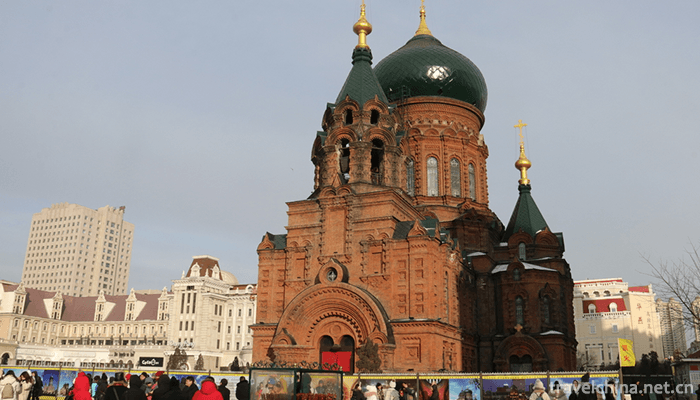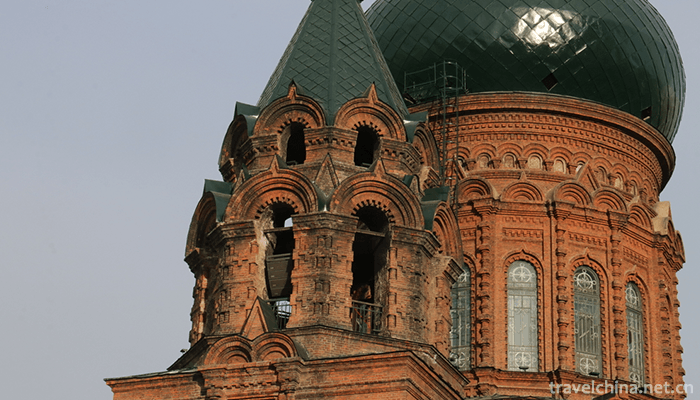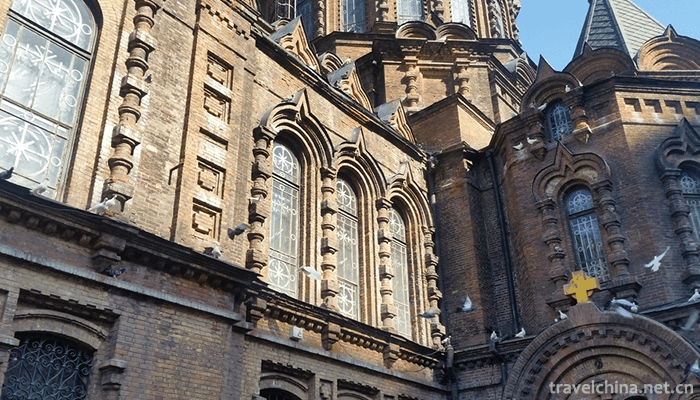Saint Sophia Cathedral in Harbin
St. Sophia Church is located in Sophia Square, Daoli District, Harbin City, Heilongjiang Province, China. It is a Byzantine-style Orthodox Church built in 1907 and is a landmark building of Harbin. In 1986, the Harbin Municipal People's Government classified it as a protected building; in 1996, it was approved by the State Council and listed as the fourth batch of key cultural relics protection units in the country. The interior of St. Sophia Church is now used as "Harbin Museum of Architectural Art".
St. Sophia Church was founded in March of 1930 (1907) in Guangxu of Qing Dynasty. It was originally built as a military chapel when the Middle East Railway was built for the 4th Infantry Division of Tsarist Russia and East Siberia. In the same year, the Russian tea merchant, Ifi Chiskakov, funded the rebuilding of an all-timber Church based on the military chapel. In 1911, a brick wall was built outside the wooden wall to form a brick-and-wood church.
On September 27, 1923, St. Sophia's Church was rebuilt for the second time. It took nine years and was completed on November 25, 1932. It became the largest Orthodox Church in the Far East. Sofia Church is designed by Russian architect Koasikov. It is magnificent, elegant and super-popular. It is 53.25 meters high and has a building area of 721 square meters. It can accommodate 2,000 people. The top of the main entrance is the bell tower. The seven copper bells are just seven notes. It is necessary to use well-trained bell strikers and feet to strike the bell with cadence. The layout of the church building is Greek cross style, which is influenced by Byzantine architectural style. The main dome, bell tower and traditional Russian "tent top" and "onion head" shapes.
In 1986, Harbin Municipal People's Government classified it as a protected building. In November 1996, it was listed as the fourth batch of national key cultural relics protection units. From June 2 to September 2, 1997, the Harbin Municipal People's Government carried out a comprehensive renovation of the church according to the original design, expanded the Sofia Square 7,000 square meters, and established it as the Harbin Museum of Architecture and Art to publicize and promote Harbin's unique architectural culture.
In 2000, the Harbin Municipal People's Government organized and expanded the construction projects of Harbin Architectural Art Square, Central Leisure Square and Urban Construction Planning Exhibition Hall. It was completed and put into use on October 1 of that year. After the expansion, the area of the building art square increased from 6000 square meters to 1000 square meters, and the area of the central square was 36154 square meters.
Architectural function
The interior of St. Sofia Church is now open to the public as "Harbin Architectural Art Gallery". The Harbin Urban Construction Planning Exhibition is on display in the museum. It is divided into three parts: historic city, construction process and planning for tomorrow. It systematically shows the style and features of Harbin's historic and cultural city and the evolution calendar of modern metropolis. Cheng, and the future development prospects of the city.
The construction project of urban construction planning exhibition hall was completed and opened to the outside world on July 1, 2001. The total floor area of underground exhibition hall is 3972 square meters. It is the first modern exhibition hall constructed in Harbin. It is divided into six areas: exhibition, demonstration, reception, office, sand table control and exhibits storage. Located in the center of the exhibition hall is the 1:600 urban construction planning sand table of Harbin, with a total area of 396 square meters, representing an urban area of 142.56 square kilometers, covering five administrative areas: Nangang District, Daoli District, Daowai District, Power Zone and Xiangfang District.
historical significance
Saint Sophia Church is an exotic cultural landscape and urban style in Harbin. It is also an important historical witness of Russia's invasion of Northeast China and a treasure of Harbin's modern history.
St. Sofia Church plays an irreplaceable role in promoting the multicultural construction of Harbin, promoting the opening up, friendly exchanges and social and economic development of Harbin.




0 Questions
Ask a Question
Your email address will not be published.